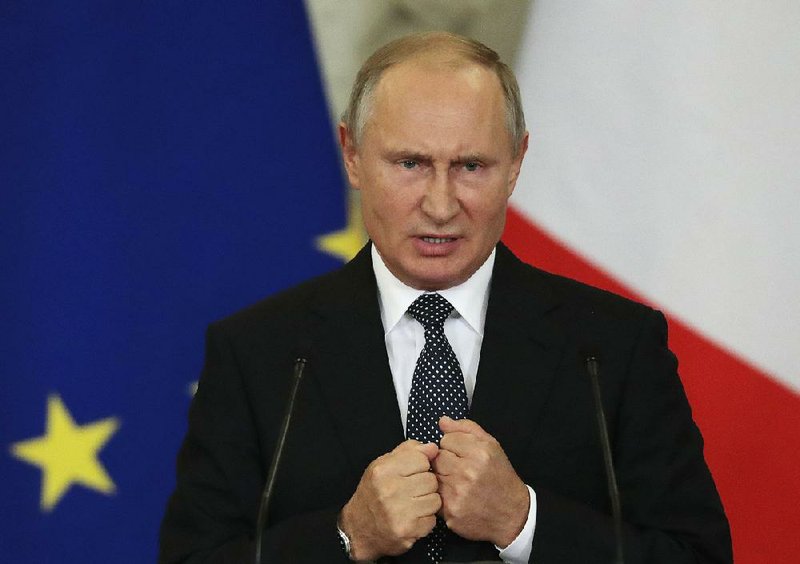MOSCOW -- Russian President Vladimir Putin warned Wednesday that if the United States deploys new intermediate-range missiles in Europe after withdrawing from a nuclear treaty prohibiting such weapons, then European nations will be at risk of "a possible counterstrike."
President Donald Trump said over the weekend that the United States intends to pull out of the 1987 agreement banning short- and intermediate-range missiles that are launched from land. He said Russia was cheating on the deal and that it was flawed because China is not a signatory.
The United States, Trump said, will develop weapons now prohibited by the treaty. The decision prompted Russian warnings of a new arms race.
On Wednesday, speaking at a news conference in Moscow, Putin said European countries would bear the risk of Trump's decision if new missiles wound up in Europe.
"The main question is, if the United States does withdraw from this treaty, what will it do with these newly emerging missiles?" Putin said. Any European nations that accept the new missiles, he said, "will have to understand that they put their own territory under the threat of a possible counterstrike."
"I don't understand whether Europe should be put in a situation of such a high level of danger," he said. "In fact, I don't see any reasons for that."
On Tuesday, speaking in Moscow, U.S. national security adviser John Bolton said the risk sprang from Russian noncompliance. He asserted that Russia had already deployed banned missiles.
The United States said the Russians have deployed ground-launched missiles known in the West as the SSC-8. They have a range banned by the treaty and are capable of hitting European targets, the Americans say.
Putin rejected the claim that Russia has breached the treaty, alleging it was the United States that violated the pact.
He said U.S. missile-defense facilities in Romania have the capability to hold intermediate-range cruise missiles.
Putin said Russia will be able to quickly deploy intermediate-range missiles if the United States withdraws from the agreement.
"This will be very rapid and effective," he said. "Indeed, what was the formal pretext of our partners withdrawing from the [Intermediate-Range Nuclear Forces] agreement? It was the accusation against us that we have ostensibly violated it."
He added that he hoped to discuss the issue with Trump in Paris when they both attend Nov. 11 events marking 100 years since Armistice Day.
"We are ready to work together with our American partners without any hysteria," he said. "The important thing is what decisions will come next."
U.S. ALLIES RESPOND
The issue has proved divisive among members of NATO. Regardless of whatever threat the new Russian missiles may pose, many European leaders have objected to Trump's plan to withdraw from the treaty.
On Wednesday, NATO Secretary-General Jens Stoltenberg said European members were unlikely to deploy new weapons.
"We don't want a new Cold War," he said. "I don't foresee that allies will deploy more nuclear weapons in Europe as a response to the new Russian missile."
Stoltenberg said he was concerned about Russian weapons but did not expect a repeat of the so-called Euromissile crisis in the 1980s. Back then, the United States deployed cruise missiles in Europe to counterbalance a perceived threat from the Soviet Union's SS-20 nuclear warheads.
"The [Intermediate-Range Nuclear Forces Treaty] is a landmark treaty, but the problem is that no treaty can be effective, can work, if it's only respected by one" side, Stoltenberg said, adding that the "U.S. is in full compliance."
He said that, based on U.S. intelligence and Russia's reluctance to discuss the missile system with NATO, "the most plausible explanation is that Russia is in violation of the treaty."
Asked whether he thought the United States should stick with the treaty, Stoltenberg said: "The challenge, the problem, is the Russian behavior, which we have seen over many years."
In Berlin, Germany's foreign minister urged his Russian counterpart to do everything possible to preserve the treaty. Heiko Maas told Russia's Sergey Lavrov on Wednesday that such efforts include clearing up the allegations that Moscow has violated the pact, the German Foreign Ministry said.
The treaty, signed in 1987 by President Ronald Reagan and Soviet leader Mikhail Gorbachev, prohibited the countries from possessing, producing or test-flying ground-launched nuclear cruise and ballistic missiles with a range of 300 to 3,400 miles.
The pact was lauded as a safeguard for global security because it eliminated shorter-range missiles that take only a few minutes to reach their targets.
With tensions over the treaty's possible unraveling mounting, NATO today officially launches its Trident Juncture war games in Norway, its biggest maneuvers since the Cold War.
Russia, which shares a border with Norway, has been briefed by NATO on the exercises and invited to monitor them, but the event has still angered Moscow.
Russian Defense Minister Sergei Shoigu warned that Moscow could be forced to respond to increased NATO military activities near its western border.
"NATO's military activities near our borders have reached the highest level since the Cold War times," Shoigu said, noting that the war games will be "simulating offensive military action."
Speaking on a trip to Belarus, Shoigu also warned that Poland's plan to permanently host a U.S. army division would affect regional stability and trigger a Russian response. He said Moscow would have to "take retaliatory measures to neutralize possible military threats."
The NATO maneuvers in Norway will involve about 50,000 personnel, 65 ships, 250 aircraft and 10,000 vehicles in a hypothetical scenario that involves restoring Norway's sovereignty after an attack by a "fictitious aggressor."
Information for this article was contributed by Andrew E. Kramer of The New York Times and by Lorne Cook, Vladimir Isachenkov and Geir Moulson of The Associated Press.
A Section on 10/25/2018
